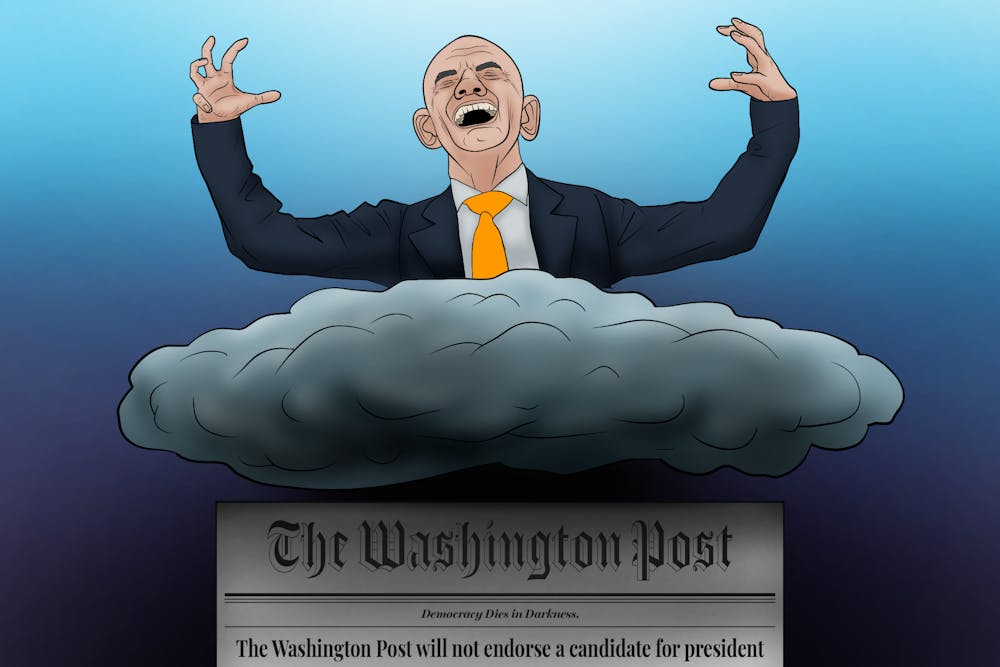On Oct. 25, The Washington Post announced that it would not be endorsing a presidential candidate in the 2024 general election. Previously, they had issued endorsements for every election since 1988. The Post's publisher, Will Lewis, wrote that the decision was evidence of the paper's belief in “readers' ability to make up their own minds on this.”
In the wake of the canceled endorsement, The Post has seen a mass exodus — hundreds of thousands of readers canceled their subscriptions, columnists resigned and nearly a third of the editorial board stepped down. Accusations of collusion between the paper's owner, Jeff Bezos, and former president Donald Trump flooded the dialogue, fueled by the fact that executives of Bezos's space company, Blue Origin, met with Trump on the same day the endorsement was killed. Bezos published a column in The Post to explain himself days later. He spoke to the public's abject loss of faith in the media and argued that presidential endorsements merely create “a perception of bias” in the media.
A number of Bezos' points ring true. We are increasingly aware of journalism's dying credibility, of the fact that instead of reaching people, “more and more, we talk to ourselves.” We even appreciate The Post's untimely attempt at maintaining some semblance of independence by not endorsing either candidate. We disagree not necessarily with the decision itself, but who made that decision. Our objection lies in the fact that The Post's Opinion editors or editorial board members did not make this decision — the multi-billionaire at the helm of the ship did.
While any suspicions of misconduct would only be mere speculation, and we take Bezos' open letter in earnest, the reality of this incident is bleak. By killing a story of such significance, alarms sound around the world that news publications' majority owners can bend stories to their will, at any time. The monopolizing and corporatizing of information will leave us all in the dark. It has already begun to.
Bezos is not the only mogul setting a precedent for the monopolization of journalistic information; Elon Musk, Rupert Murdoch, Michael Bloomberg and others do it, too. If all of our channels of news and information can be skewed by the billionaires and hedge funds who own them, the very fundamental principles of the free press are threatened. In order to avoid putting the financial burden on readers and restricting access to information through subscription fees, news organizations must look to other sources for the necessary financial support. However, with that financial backing comes the risk that journalists lose autonomy.
In July 1972, when The Daily Tar Heel was still funded through student fees, four UNC students filed a suit against the University. They opposed financially supporting views they disagreed with that were published in the paper. In 1993, The Daily Tar Heel stopped receiving UNC student fees to completely separate itself financially from the University and began relying on advertising revenue. This allows us as journalists to write and publish what we see fit without the possibility of interference from biased outsiders.
In killing this endorsement, Bezos has ensured that the lines between a functioning, for-profit newspaper and a corrupt, mercenary corporation will continue to blur. Journalists must act as watchdogs. They cannot fulfill this role with forced submission to a billionaire whose involvement in current events is inherently political due to the sheer wealth he commands. Private capitalist and journalistic interests cannot coexist ethically at such a national organization as The Washington Post.
The loss of over 250,000 subscribers to The Post demonstrates that overall distrust in the media will only persist when wealthy corporations and owners have the final say over what gets published. As an influential voice in American politics, voters look to editorial boards like The Washington Post's to make informed judgments during high-stakes elections. Now, they only have reason to distrust us more.
Alexander Hamliton once said that the national debt was to be a good thing: organizations that America was indebted to had a vested interest in our success so their debts could be paid. Instead of being indebted to the public to ensure quality reporting, news media is increasingly at the whims of singular individuals with autonomous control over their businesses.




